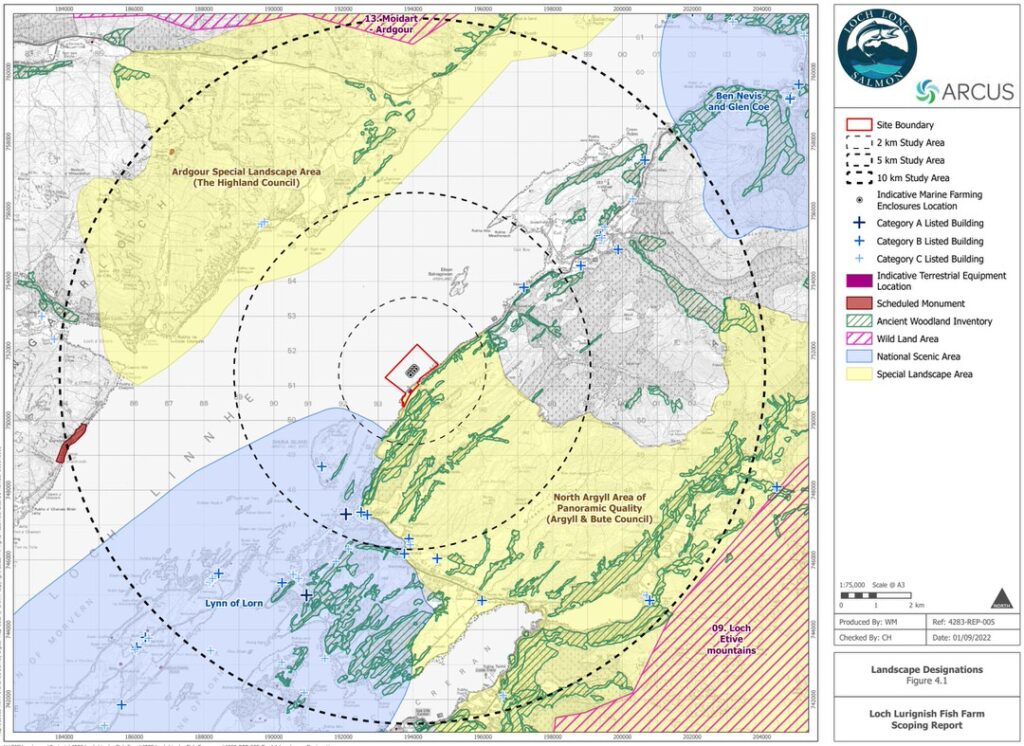After a sustained campaign by local communities in October 2022, Loch Lomond and the Trossachs National Park Board overwhelmingly refused planning permission for a semi-closed fish farm at Beinn Reithe, Loch Long.
The Loch Long Salmon Company (LLSC) is now proposing the construction of Scotland’s largest fish farm on the east shore of Loch Linnhe, Argyll. The development, appears to use the same unproven semi-closed containment technology that was proposed for Beinn Reithe, however would double the salmon biomass envisaged for Loch Long to 8,000 tonnes at Loch Linnhe.

A Scoping Request was submitted to Argyll & Bute Council in November 2022 outlining the Loch Linnhe development which would comprise 8 circular semi-closed containment enclosures; a 50m square-shaped semi-closed harvesting facility; floating pontoon; and associated land-based facilities. The site would also include 8 oxygen storage vessels of 15m in height along with 8 – 10m feed silos; a 13m high wastewater treatment plant; and associated site infrastructure.
The semi-closed containment technology includes a flexible, impermeable, opaque wall suspended from a floating collar and tapering to a point, which LLSC claims prevents water from entering the enclosure. Inside the enclosure is a small mesh net as a double barrier and claimed to stop fish escapes. The majority of waste from the feed pellets along with faeces sink to the bottom of the enclosure and is pumped ashore. Water is pumped into the enclosure from a depth of 20m, which the company says will reduce or prevent sea lice from entering the system.
However, there remain significant environmental risks with this new technology, already discussed by a number of experts regarding the Loch Long proposal.
Semi-closed containment has never been tested in Scotland and in these confined locations (a sheltered location is required for the technology), there is a greater risk of soluble contaminants, nitrogen and phosphorus containing wastes promoting toxic algal blooms, which in turn produce toxic or harmful effects on people, fish marine mammals and birds.
The semi-closed technology has previously been trialled and abandoned in Canada and more recently in Norway two semi-closed cages were damaged during a storm in which 400 litres of diesel was released into the fjord.
“Semi-closed salmon farming is likened to low tar cigarettes and should still carry an environmental health warning,” said Don Staniford, Director of $camon $cotland (formerly Scottish Salmon Watch). “The farming of salmon in cages – whether they are open, closed or semi-closed – is a welfare nightmare with serious ecological impacts. Even if closed containment can mitigate the risks of escapes and interaction of marine mammals; the problems of mass mortalities, infectious diseases and unsustainable feed resources will never go away. Put simply: there is no right way to do the wrong thing. The lesser of two evils is still evil. However you slice it, salmon farming is bad for the health of our oceans and fatal to the health of both wild and farmed fish. Locating yet another salmon farm – which would be far and away Scotland’s largest ever – in Loch Linnhe which is already littered with disease-ridden cages, is sheer lunacy.”
The chosen location is particularly surprising given that LLSC company director Stewart Hawthorne stated at the Loch Long Public hearing in October “..to show its true potential to transform the rest of the salmon farming industry in Scotland, we needed a location separated from existing salmon farms. This site is uniquely placed to do this because it’s in the right place“. Clearly, Loch Long was not unique, given that the proposed Loch Linnhe farm is just 2km (or 900m from the closest point of the site boundary) from the Scottish Sea Farms fish farm at Shuna Island.
Argyll and Bute Council – Lurgnish Fish Farm Ref: 22/02263/SCOPE
Statutory consultee comments close on 6 December. Scoping Request Documents (Ref. 22/02263/SCOPE) can be viewed at https://portal360.argyll-bute.gov.uk/planning/planning-documents?SDescription=22/02263/SCOPE .
